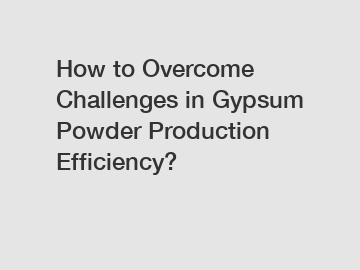Ozone Water Treatment vs. Traditional Methods: Maximizing Agricultural Benefits
Understanding Ozone Water Treatment
Ozone water treatment significantly surpasses traditional methods in maximizing agricultural benefits. This innovative technique not only enhances the quality of irrigation water but also promotes soil health and crop growth, ultimately leading to higher yields and reduced dependence on chemical fertilizers.The Science Behind Ozone Water Treatment
Ozone, a powerful oxidizing agent, is generated by passing oxygen through an electrical discharge. When dissolved in water, ozone reacts with pathogens, organic materials, and pollutants. The oxidation process effectively eliminates harmful microorganisms and reduces contaminants such as pesticides and heavy metals. In contrast, traditional methods like chlorination often leave harmful by-products, which can pose risks to both crops and the environment.Ozone treatment leads to clearer, cleaner water that supports healthy soil conditions. The absence of harmful residues allows beneficial microorganisms to thrive, contributing to improved soil structure and fertility. Through ongoing research and field trials, evidence has demonstrated that crops irrigated with ozonated water exhibit enhanced growth rates, better resilience against diseases, and increased nutritional quality.Comparative Analysis of Traditional Methods
Traditional water treatment methods, such as filtration and chemical disinfection, can be effective but come with limitations. For instance, chlorine can kill pathogens, yet it may leave chemical by-products that are harmful to human health and ecosystems. Additionally, these methods often require ongoing maintenance and monitoring to ensure efficacy, further increasing their cost and complexity. By contrast, ozone treatment is a one-time generation process that requires less maintenance, lowering operational costs. Furthermore, as ozone quickly decomposes back into oxygen, it leaves no residuals, ensuring that both crops and soil remain free from harmful chemicals.Significance and Impact on Agriculture
The benefits of ozone water treatment extend beyond improved crop yields. By adopting this method, farmers can significantly reduce their reliance on chemical fertilizers and pesticides, promoting sustainable agricultural practices. This transition aligns with global goals for environmentally friendly farming and food security.Moreover, as consumers increasingly demand organic and sustainably produced food, farmers using ozone treatment can gain a competitive edge in the market. They can market their produce as being grown with environmentally safe practices, appealing to health-conscious consumers. The overarching impact of this shift in water treatment technology is profound. It paves the way for more sustainable farming practices that prioritize both economic viability and environmental health. By choosing ozone water treatment, farmers are not only enhancing their own operations but also contributing to a healthier planet for future generations.If you are looking for more details, kindly visit ozone water treatment for agriculture, 800g Ozone Generator supplier, ozone maker exporter.
Recommended article:How Does Ozone Water Treatment Benefit Agriculture?
Boost Efficiency: The Essential Guide to Compact Strapping Machines
How to Choose Subracks Electronic Packaging Systems?
Top Shielded Instrument Cases Traders in 2024
How Does 19" Schroff Subrack ODM Enhance Efficiency?
Industrial Steam Generator vs. Traditional Boiler: Key Differences Explained
The Advantages of Implementing a 140TPD Multi-story Wheat Flour Milling Plant SolutionRecommended article:
How to Choose the Right Schroff Subrack OEM?
Key Benefits of Dry Oil Free Air Compressors
Revolutionize Your Business with a Jewellery Plating Machine
Understanding EMC Enclosures Export: A Comprehensive Guide for Businesses
How Can an Animal Feed Pellet Mill Save You Time and Money?
Are Your Battery Packs Safe and Compliant with Regulations?
Best Strapping Machines for Small Packages: Top Picks 2023









